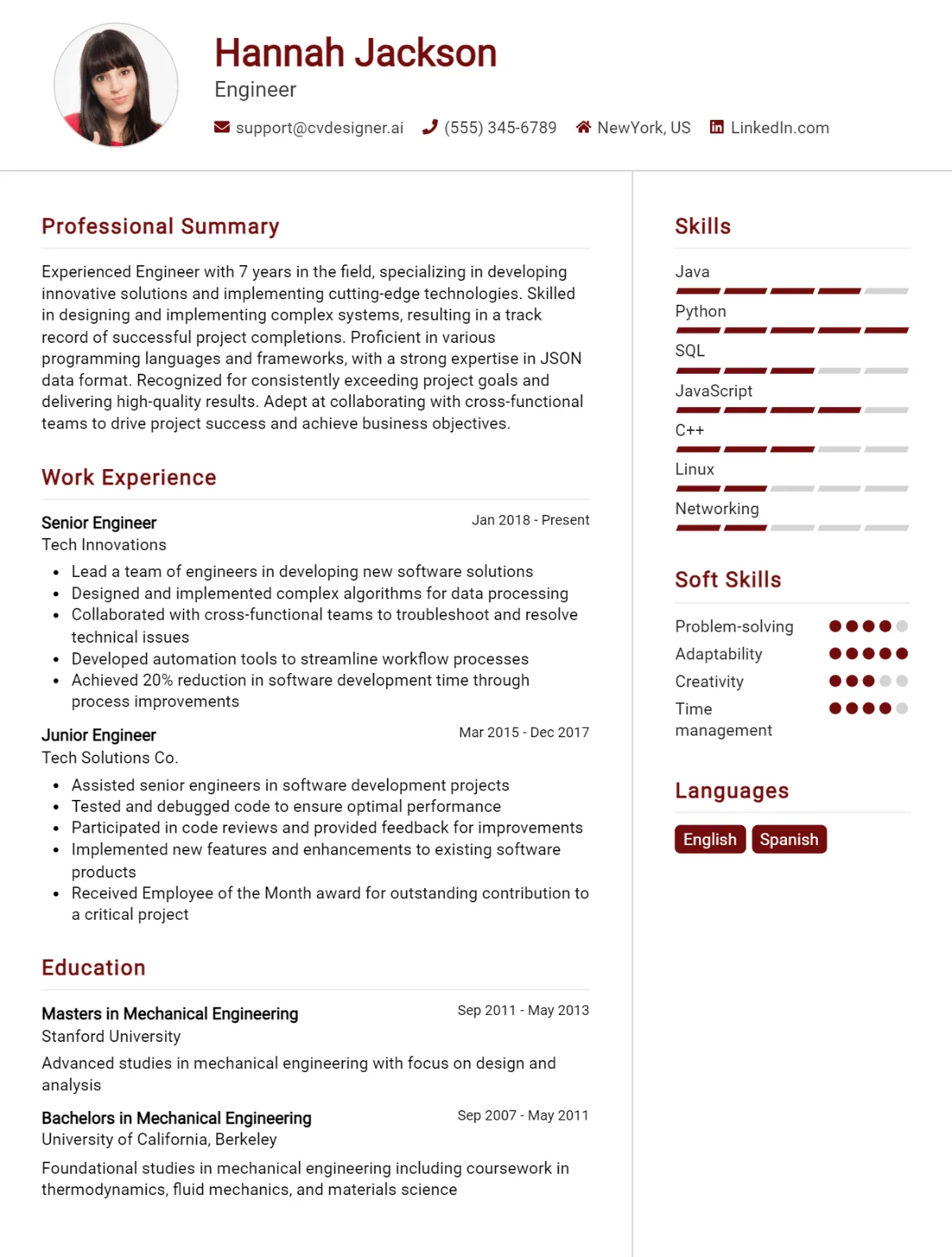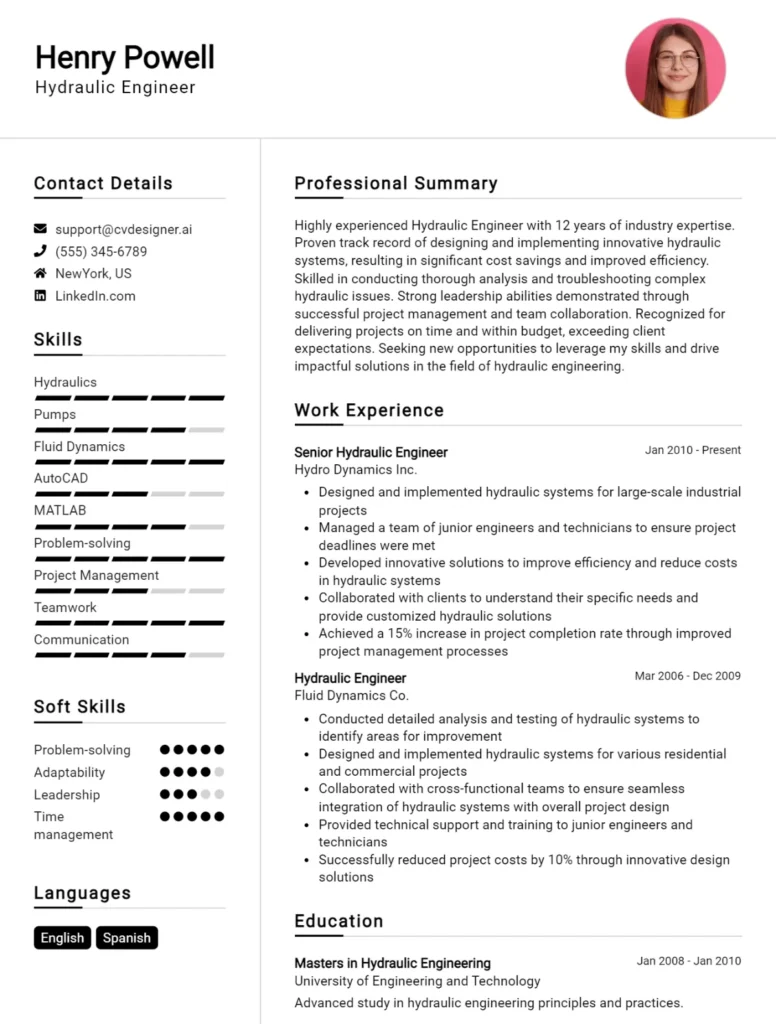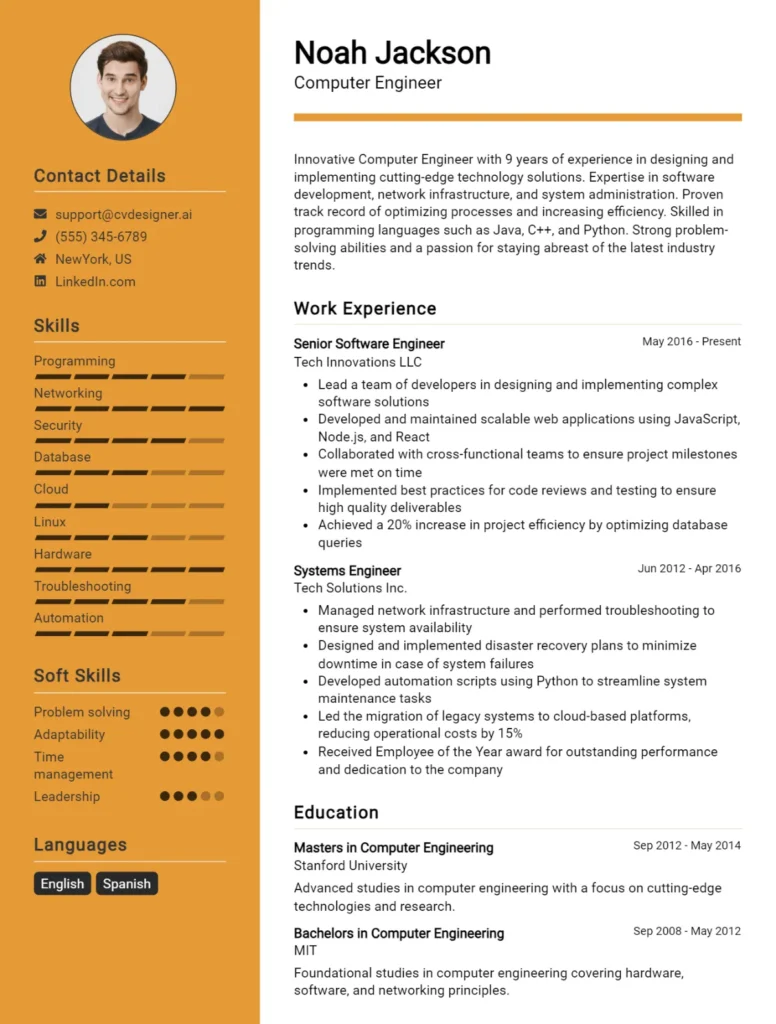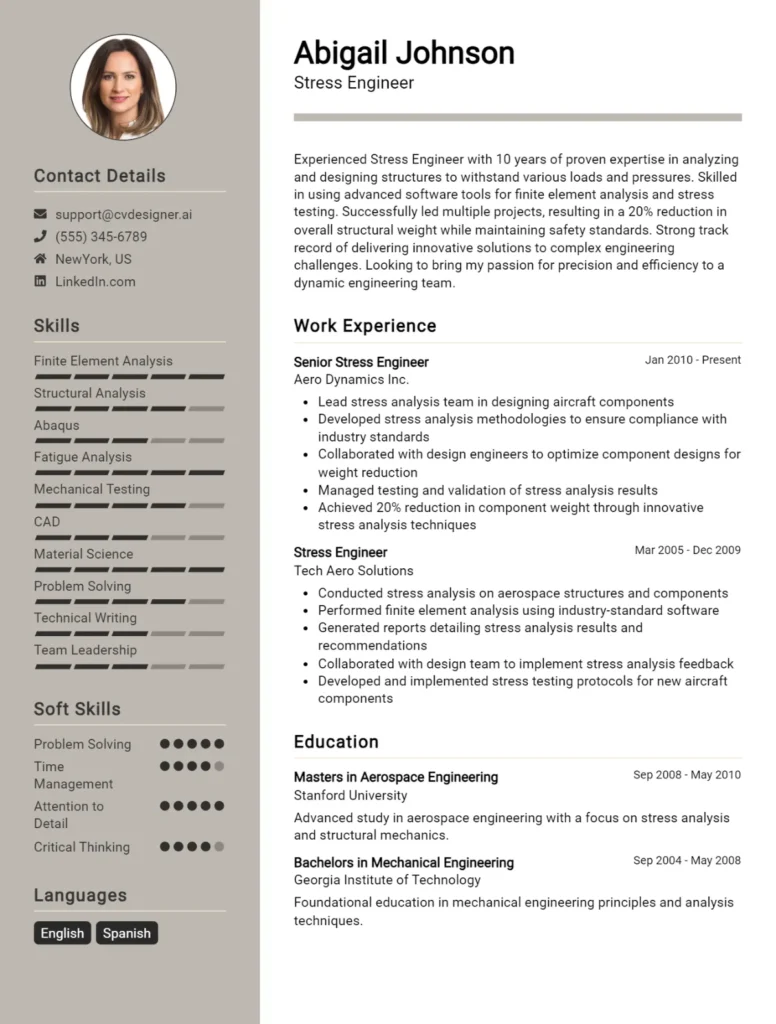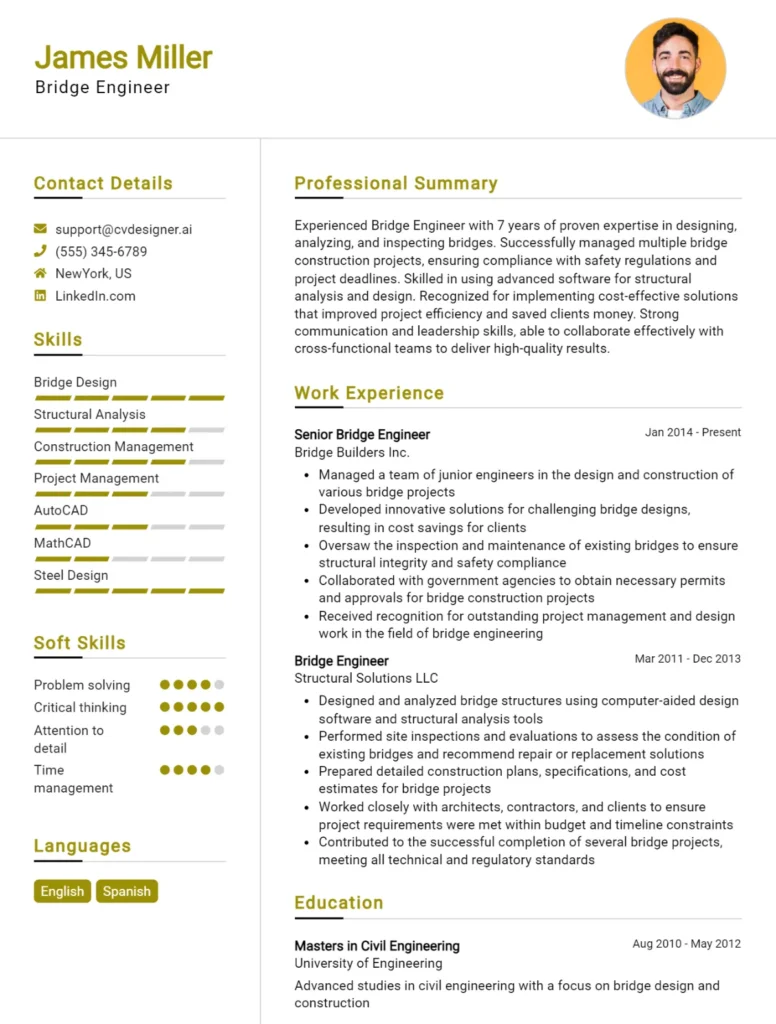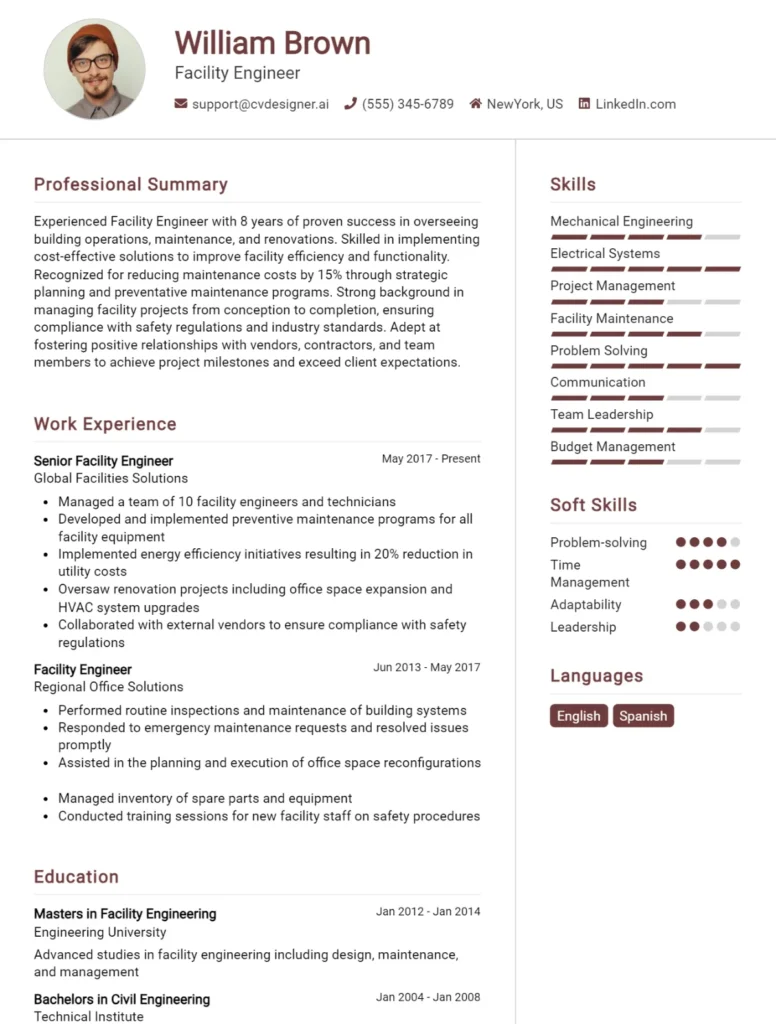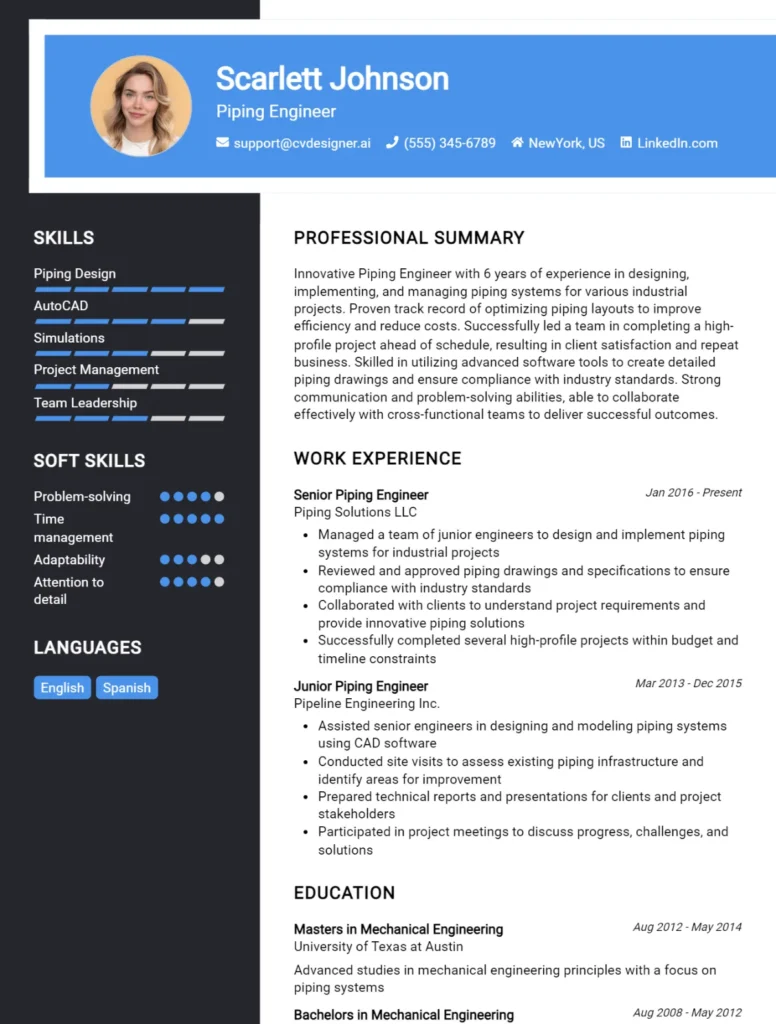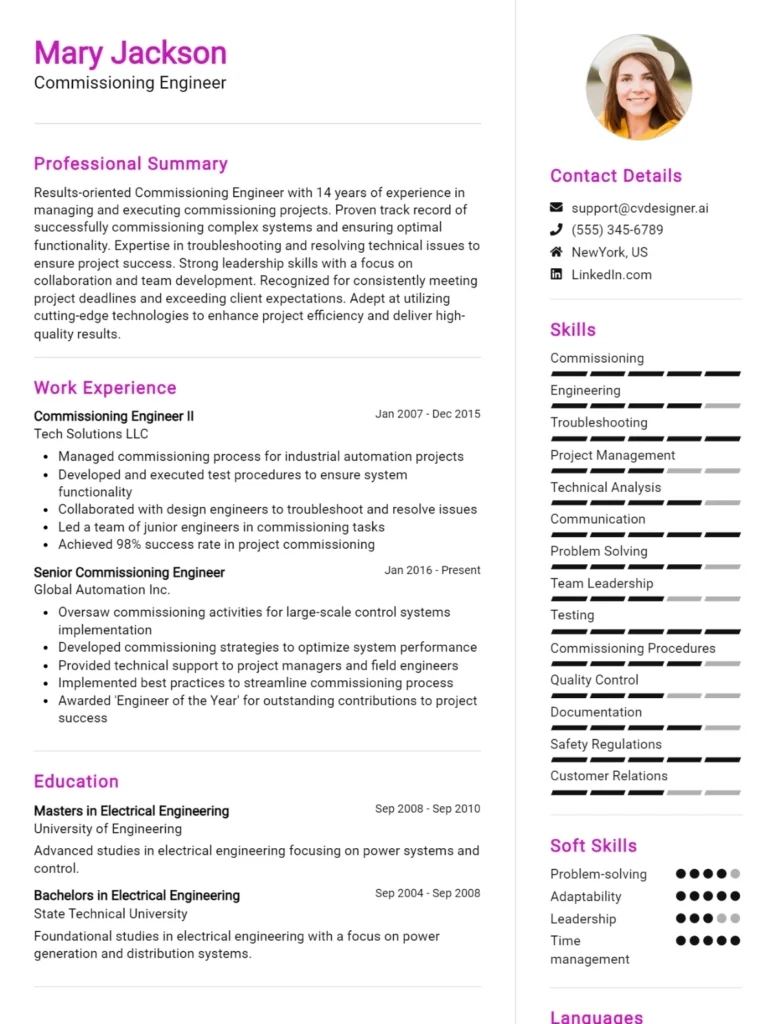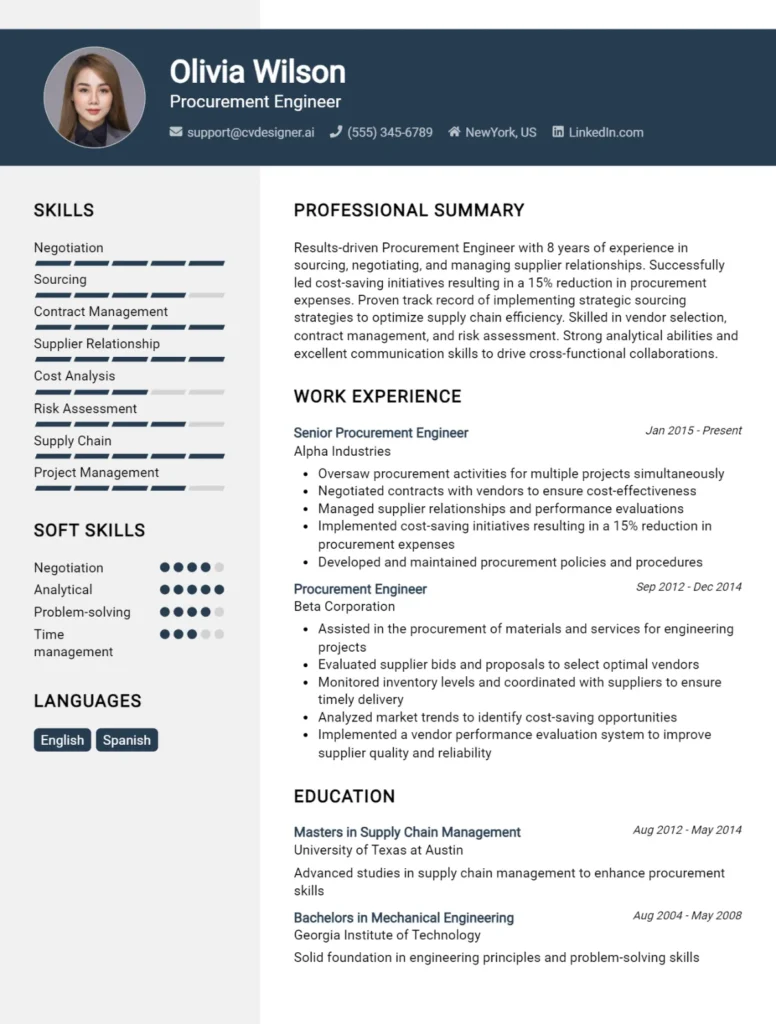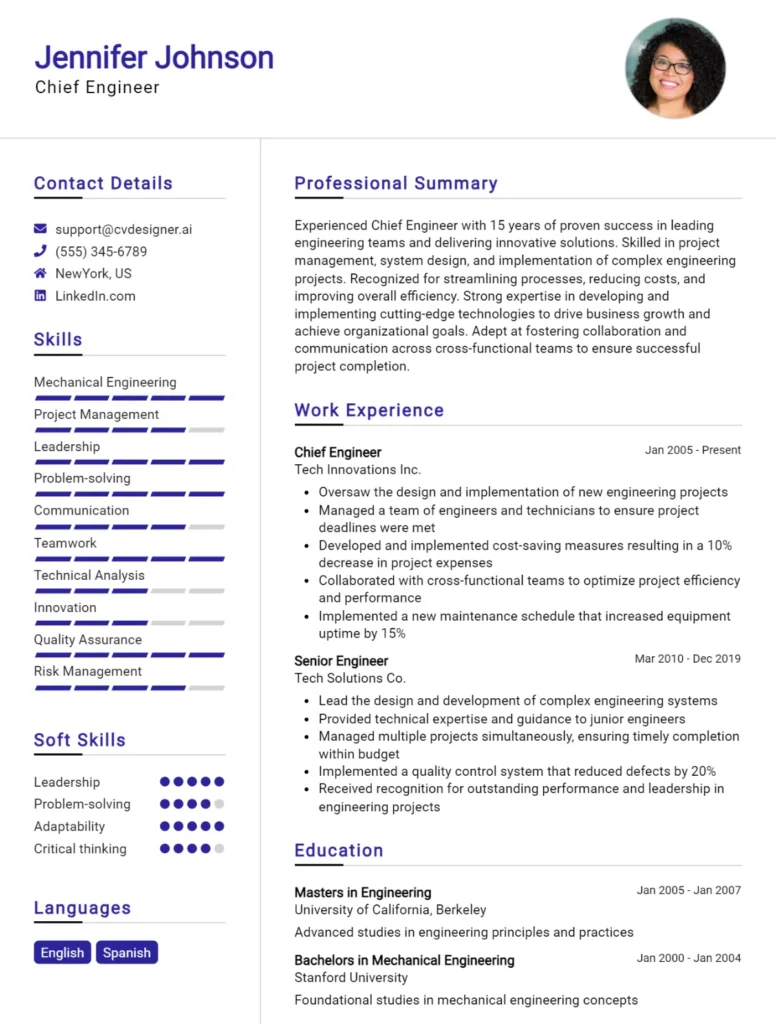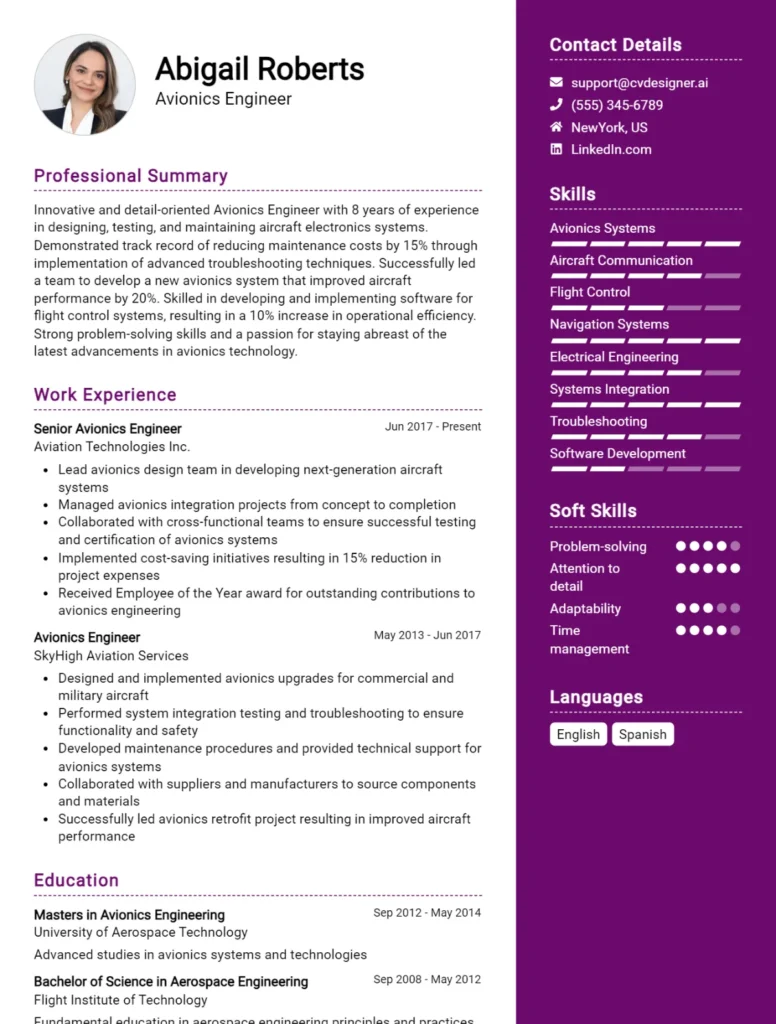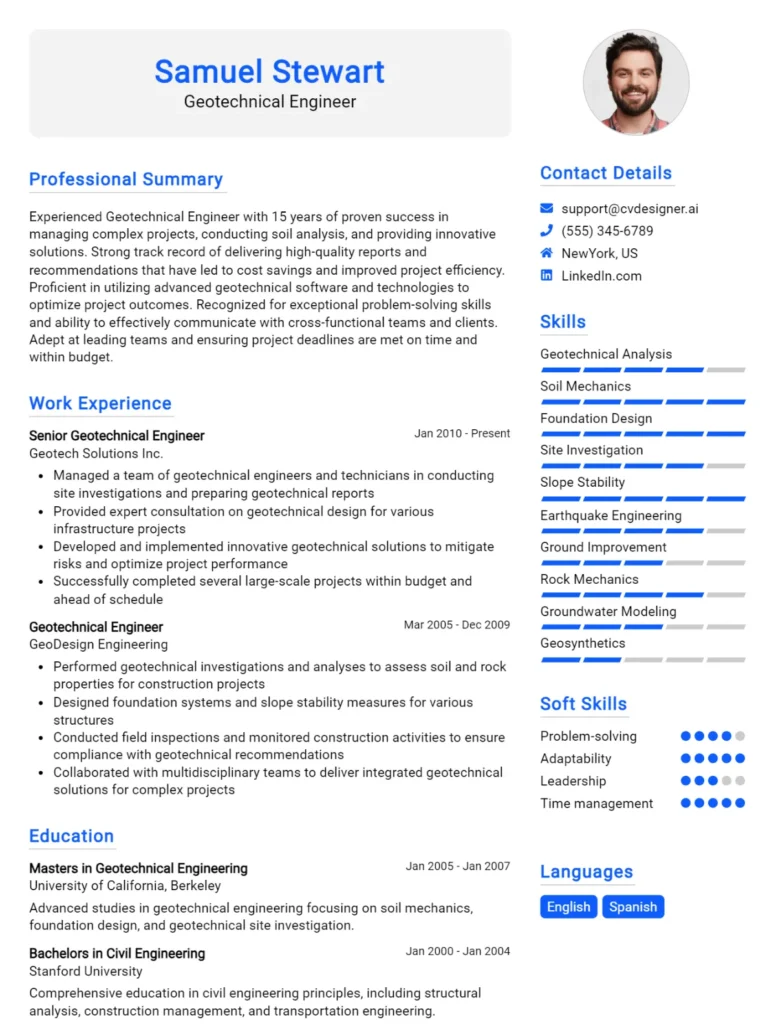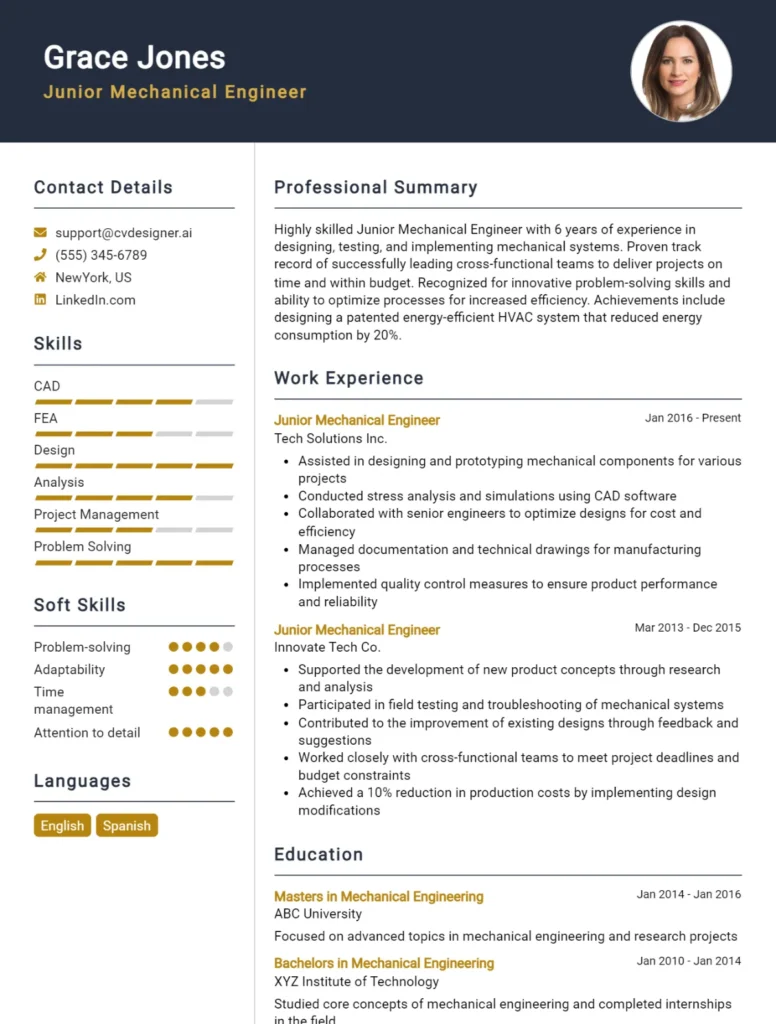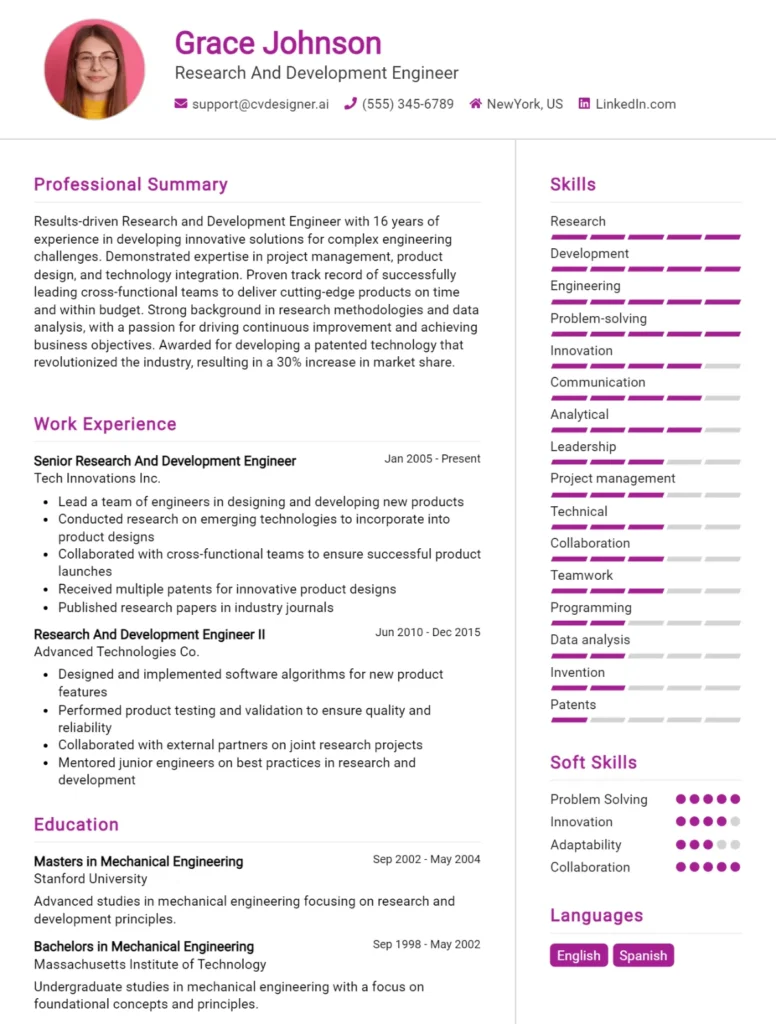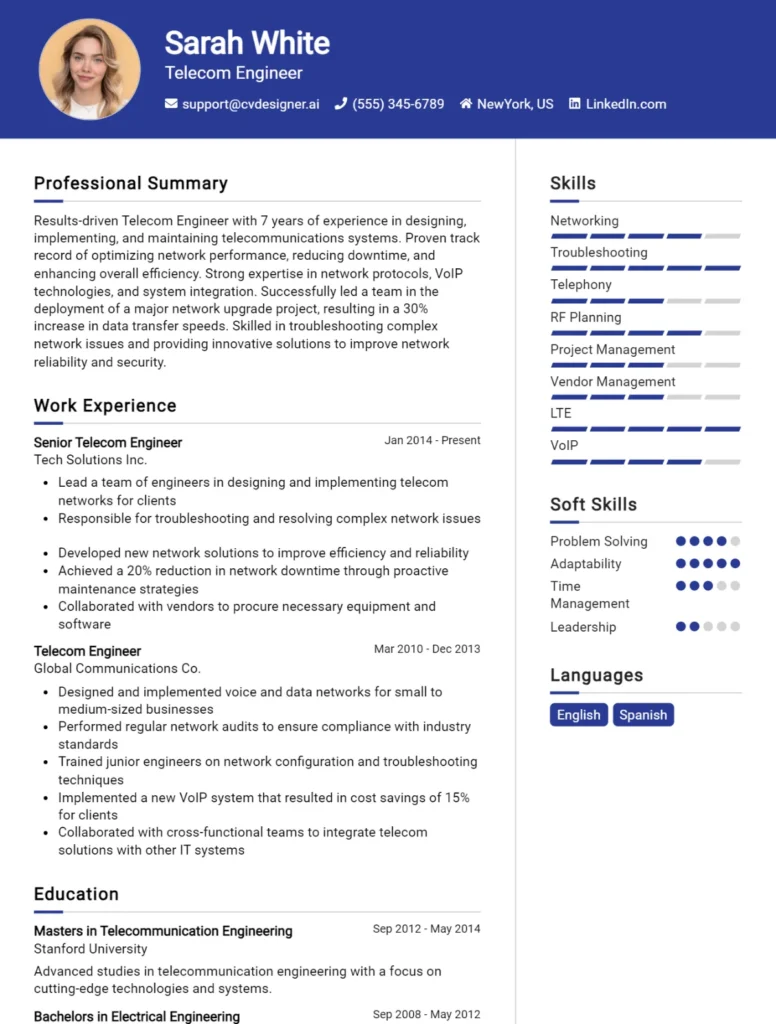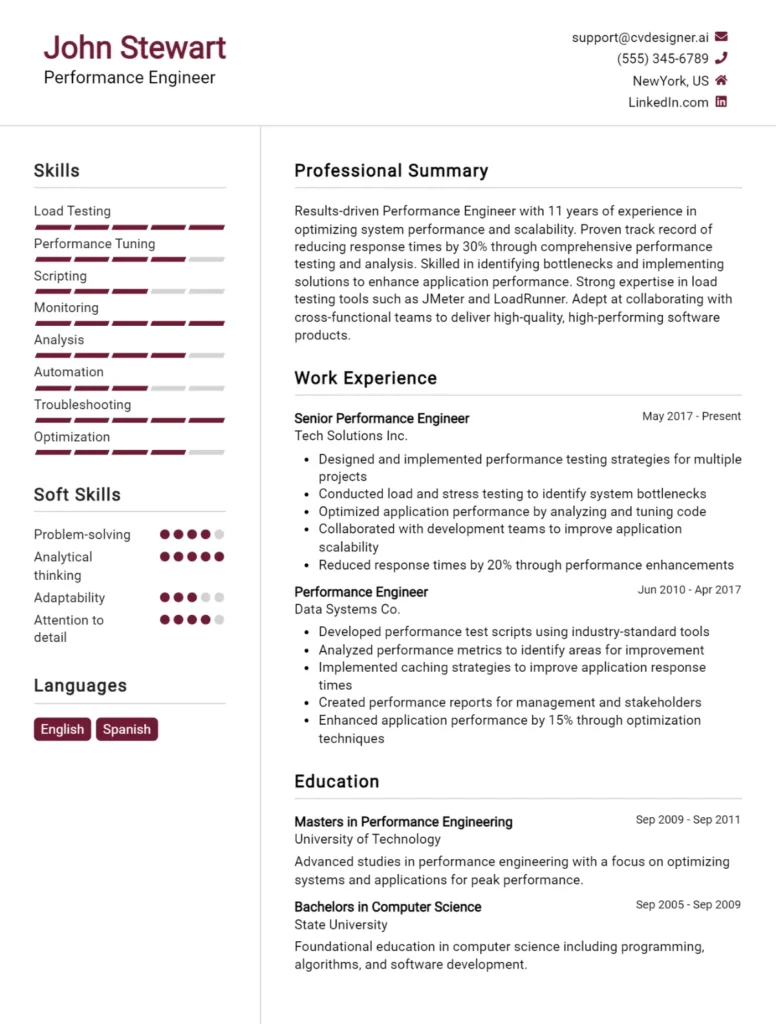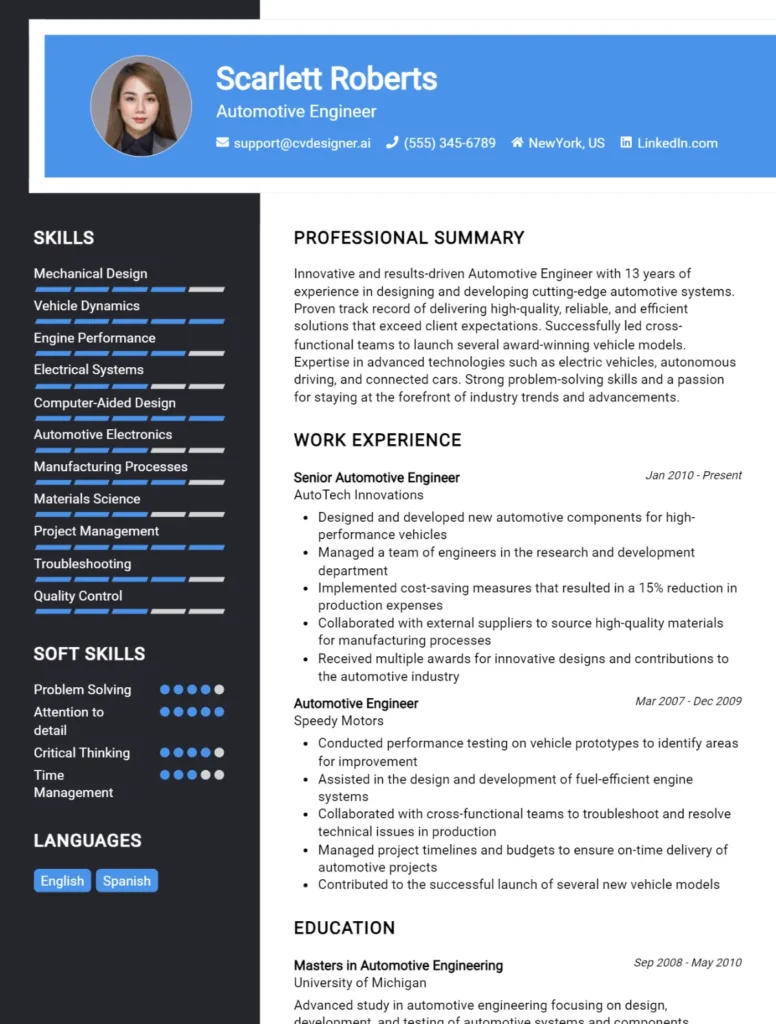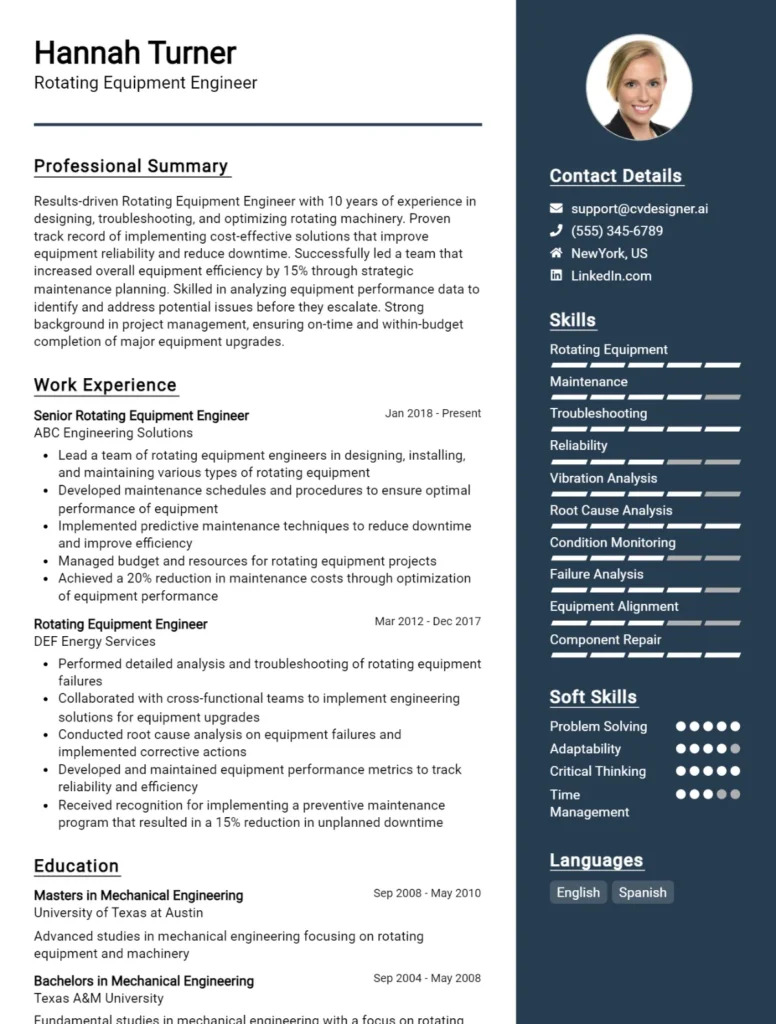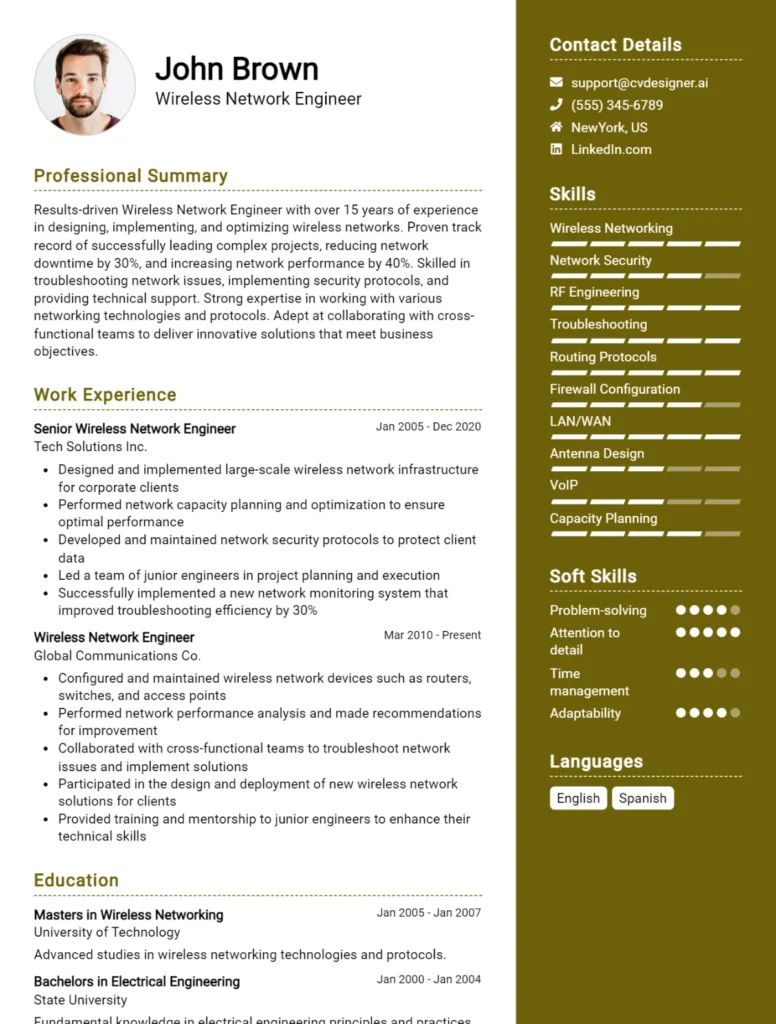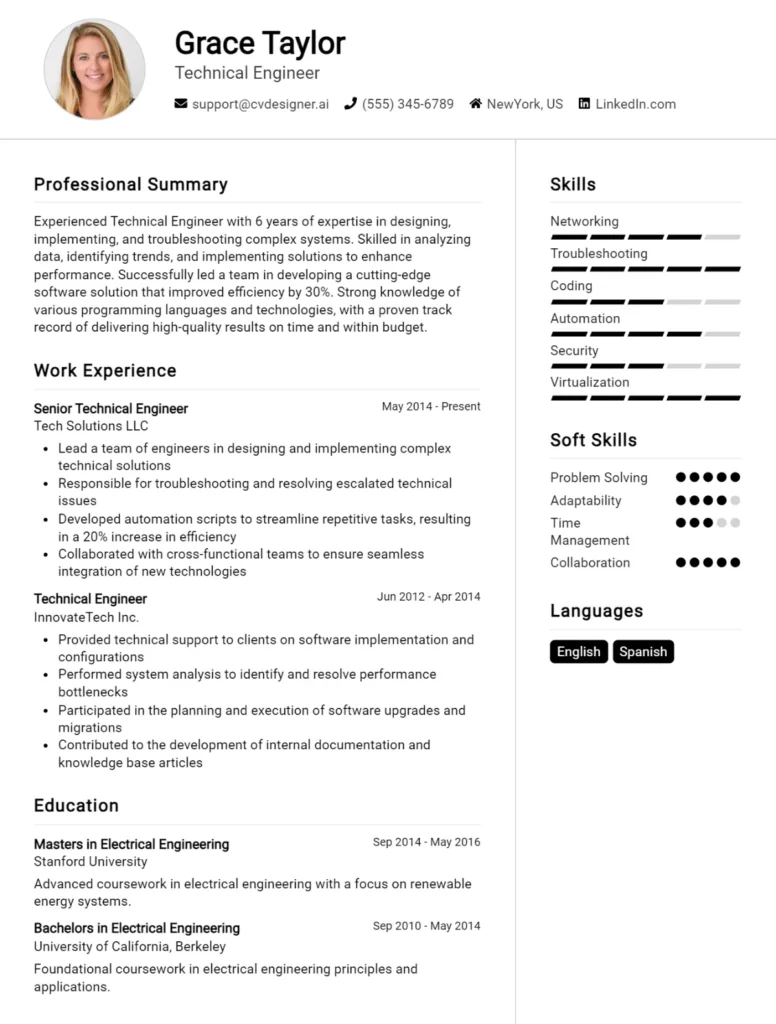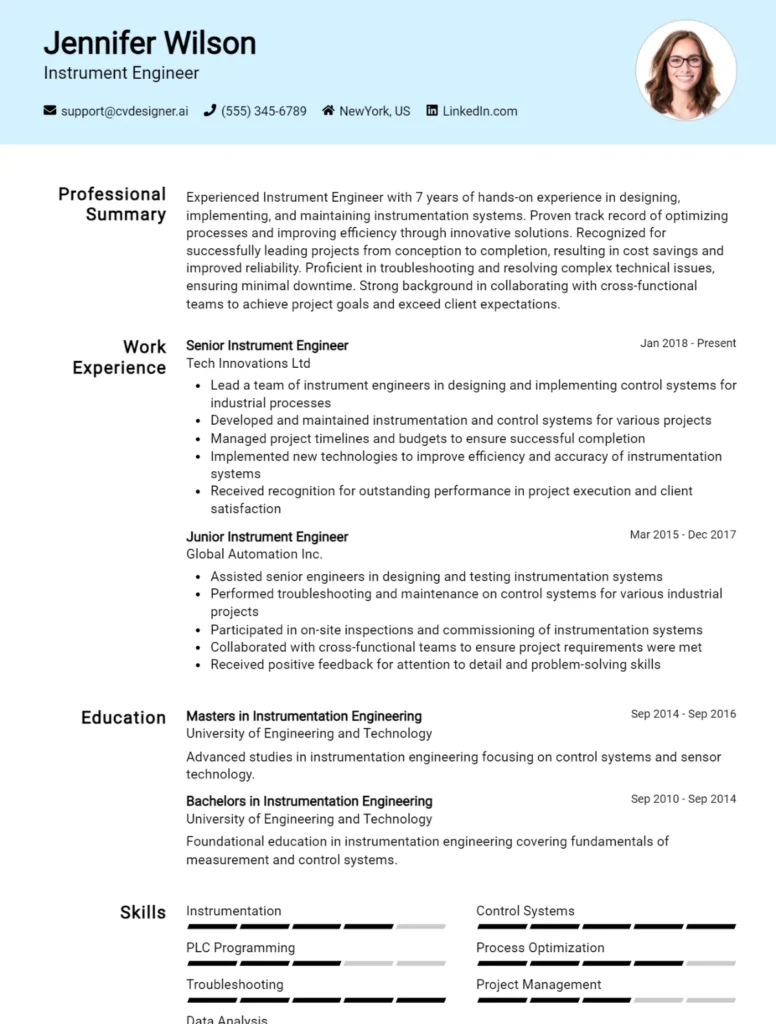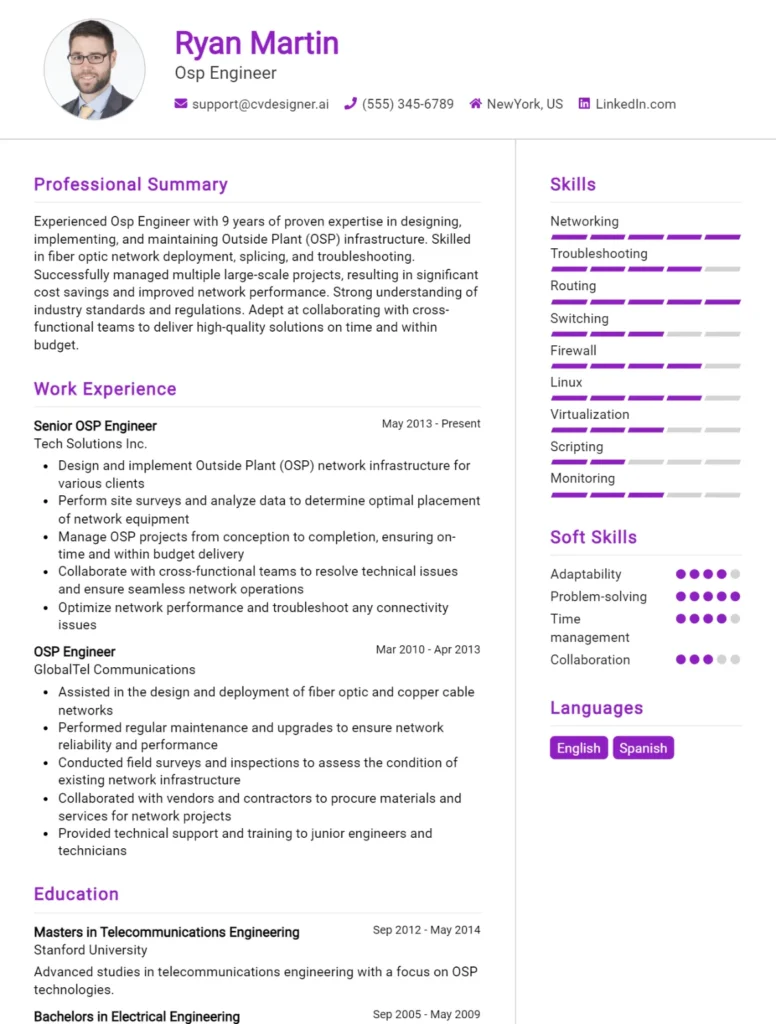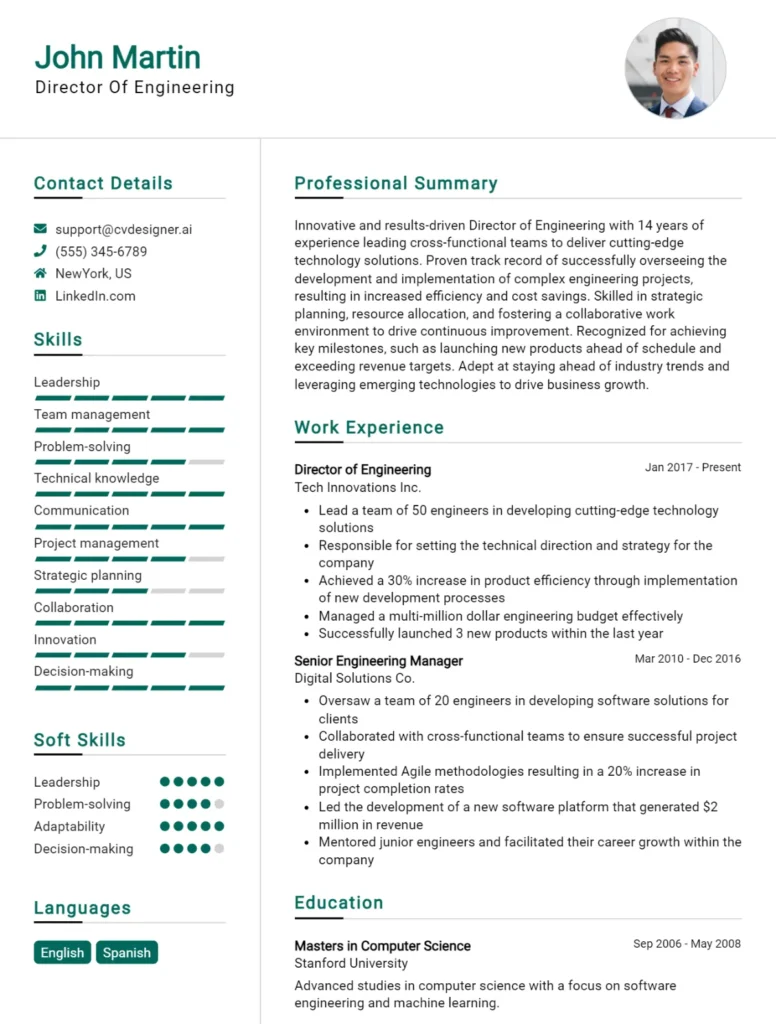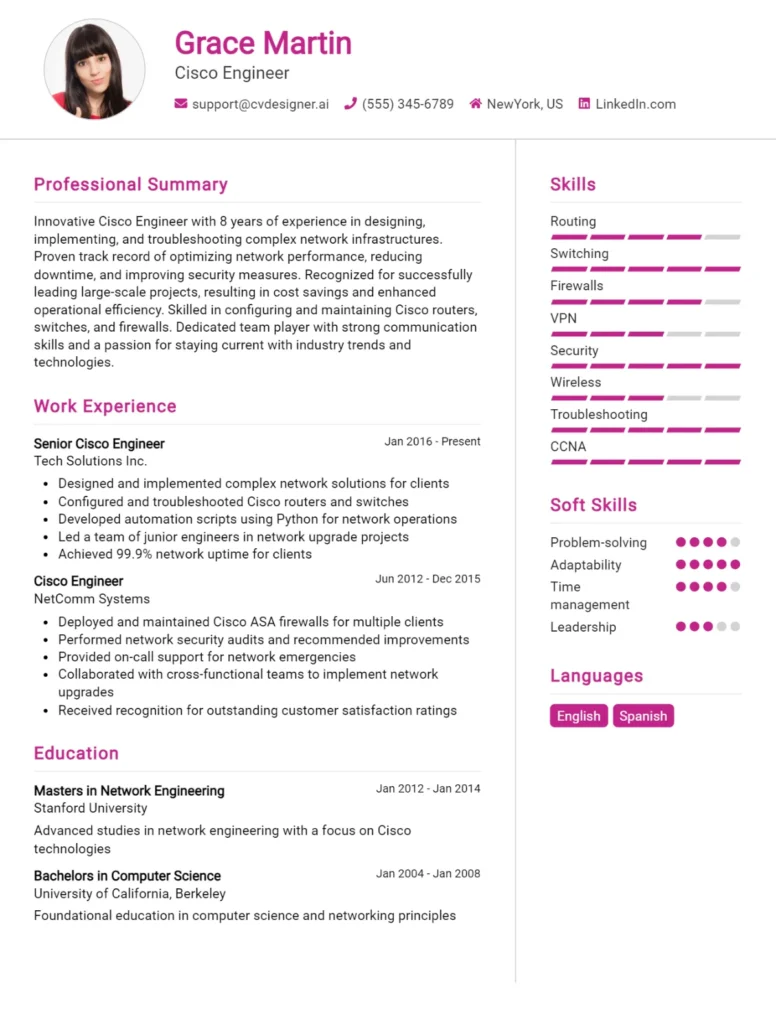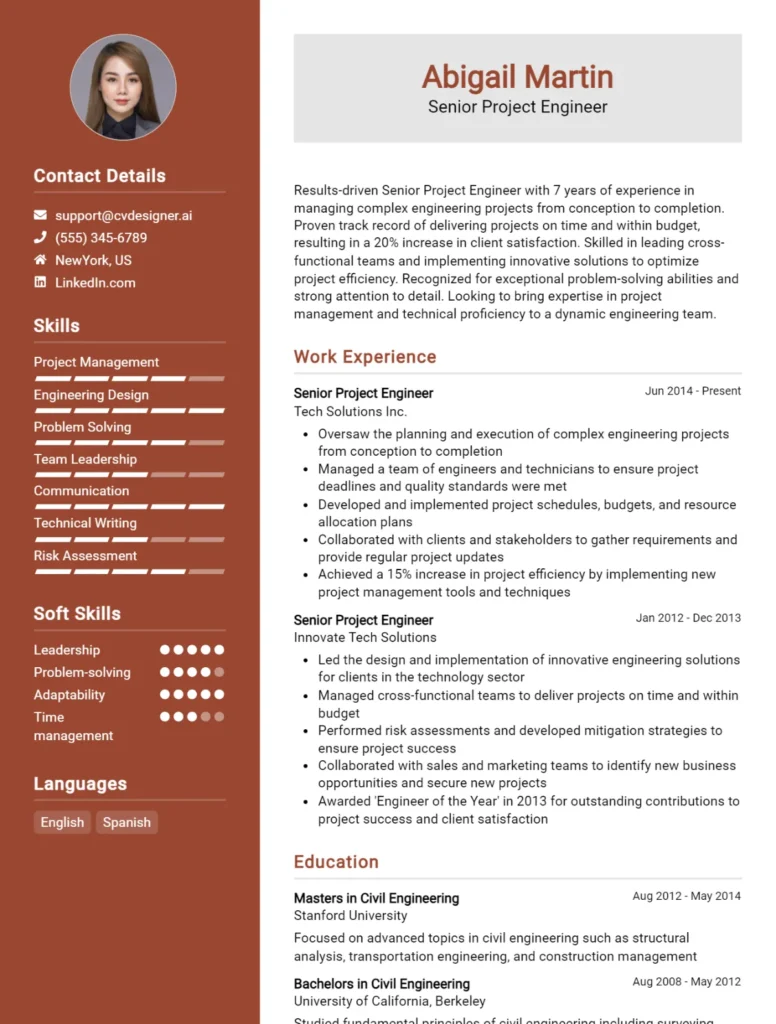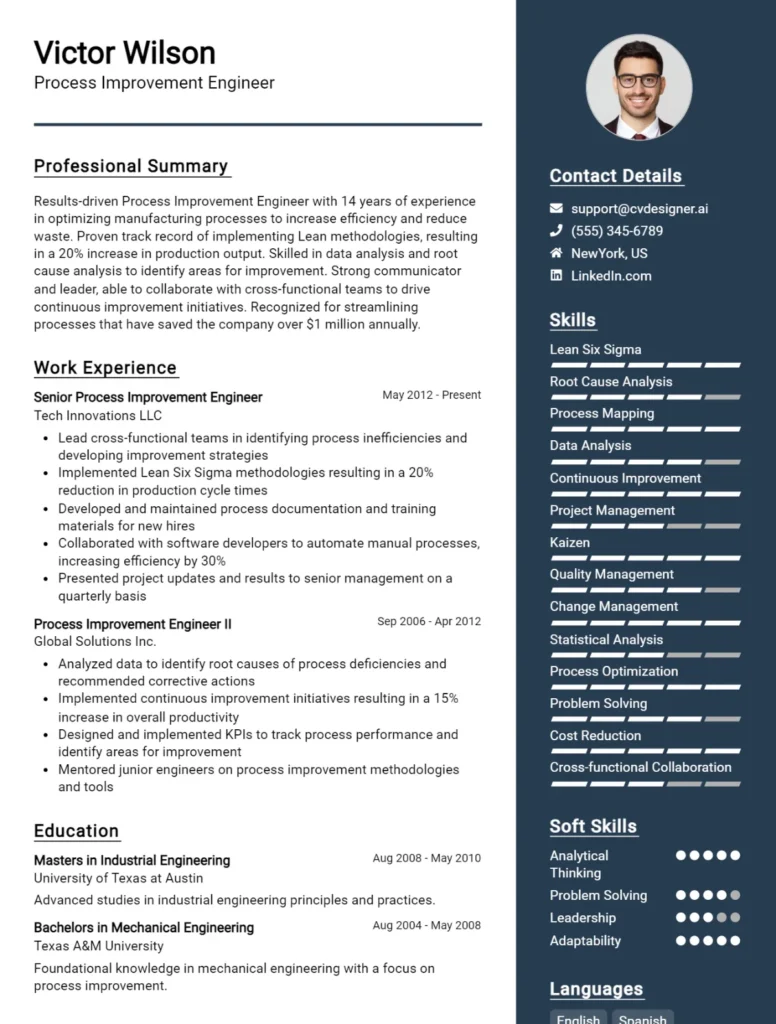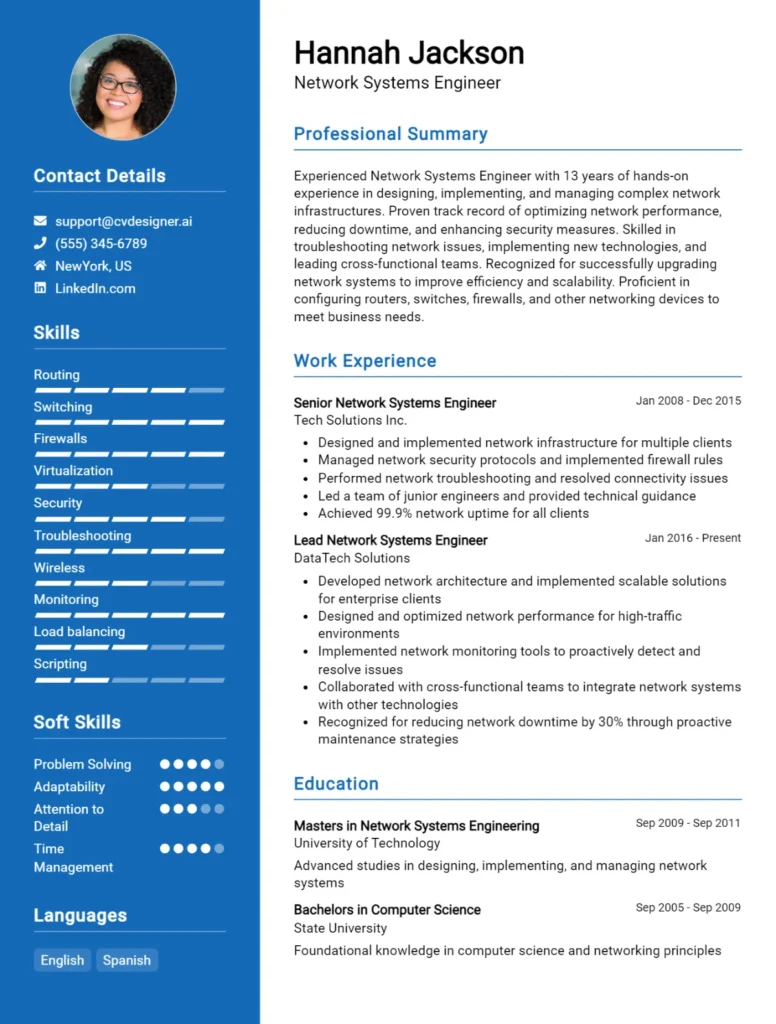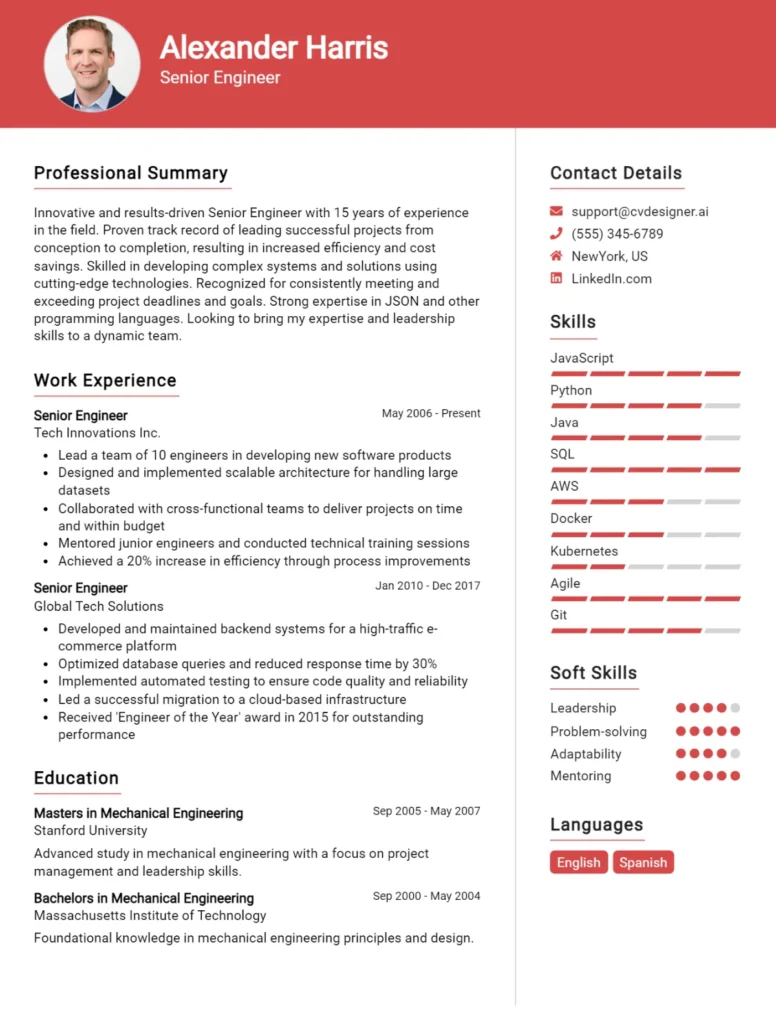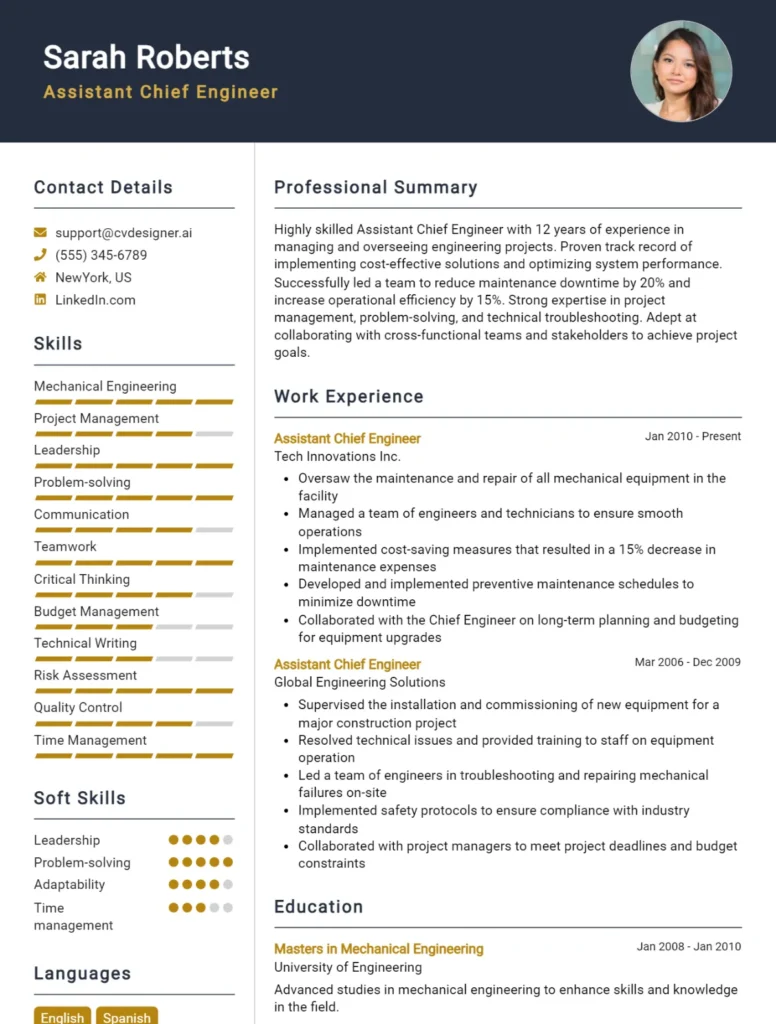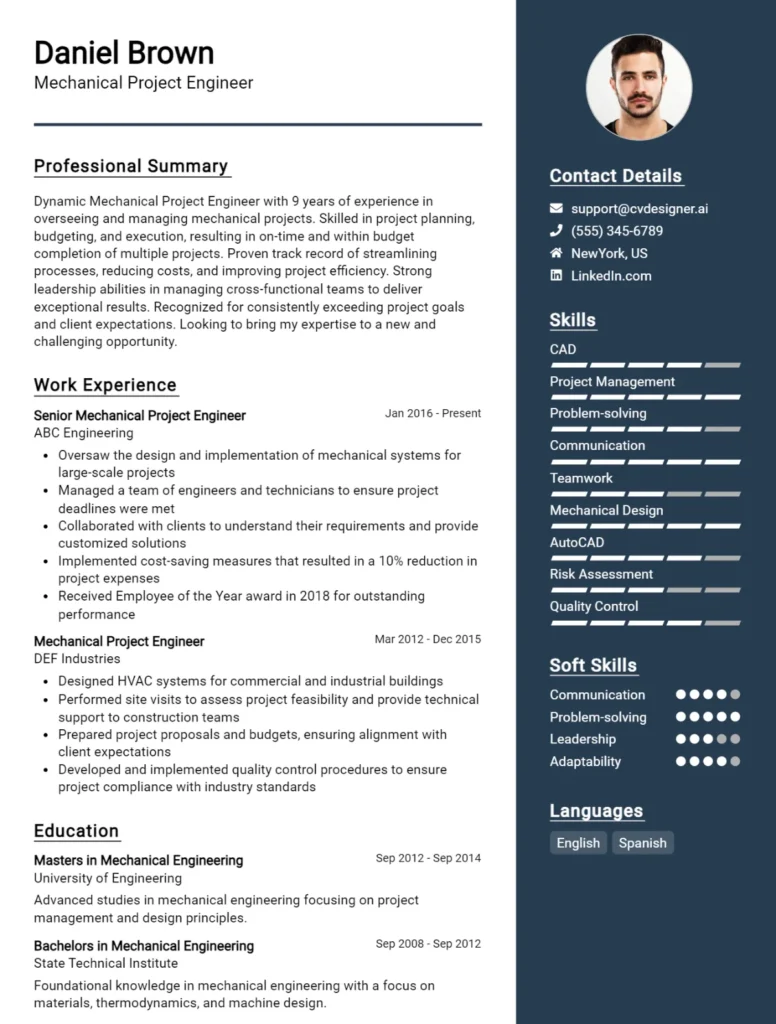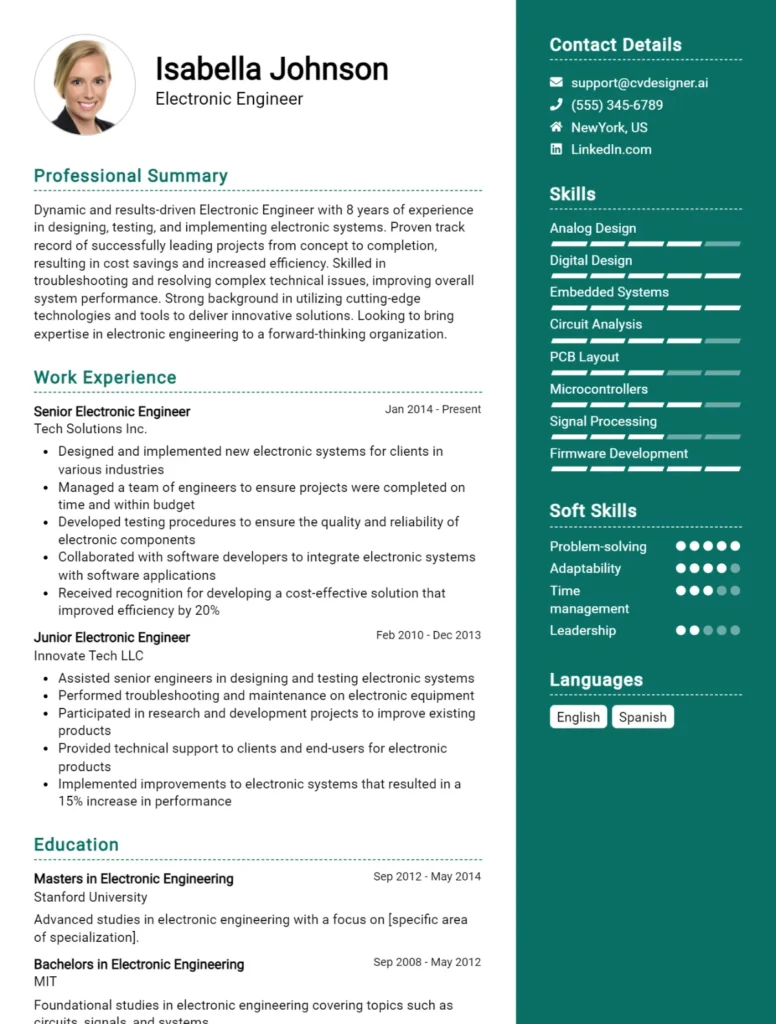Most Popular Engineer CV Examples
Explore additional Engineer CV samples and guides and see what works for your level of experience or role.
Crafting a standout CV as an engineer can be the difference between landing that dream job and getting lost in a sea of applicants. In a competitive job market where technical skills and experience are essential, your CV must not only highlight your qualifications but also showcase your unique contributions to previous projects. This comprehensive guide provides you with invaluable insights into engineering CV writing, ensuring you present your professional journey in the best light possible. By the end of this article, you will be equipped with essential tips to create a compelling CV, along with a practical example to guide you. Here’s what you can expect to learn:
- Key elements to include in your engineering CV
- How to effectively showcase your technical skills and projects
- Tips for tailoring your CV to specific job applications
- Common mistakes to avoid to ensure your CV stands out
- Formatting and layout best practices for maximum impact
Join us as we delve into the art of CV writing for engineers and set yourself up for success in your job search!
What is a Engineer CV?
A CV, or curriculum vitae, is a crucial document for engineers that outlines their professional journey, skills, and qualifications. It serves as a marketing tool that showcases an engineer's technical expertise, project experience, and educational background to potential employers. A well-crafted CV not only highlights relevant accomplishments and competencies but also reflects an engineer's ability to communicate effectively, which is essential in collaborative environments. For a comprehensive approach to creating an impactful CV, consider following a cv writing guide that provides valuable insights into structuring and formatting your information.
In the competitive field of engineering, a strong CV can significantly enhance job prospects and career advancement opportunities. It allows engineers to present their unique value proposition, demonstrating how their skills align with the needs of employers. Additionally, utilizing a cv maker can streamline the process, ensuring that the final document is polished and professional. By investing time in developing an effective CV, engineers can open doors to exciting projects and roles that align with their career aspirations.
Key Components of a Engineer CV
- Contact Information: Include your full name, phone number, email address, and LinkedIn profile or personal website if applicable.
- Professional Summary: A brief overview of your experience, skills, and what you bring to the engineering field.
- Education: List your degrees, institutions attended, graduation dates, and any relevant coursework or honors.
- Certifications and Licenses: Include any relevant engineering certifications (e.g., PE, PMP) or licenses that demonstrate your qualifications.
- Technical Skills: Highlight your core competencies and technical skills relevant to the engineering role. For more details, visit skills.
- Work Experience: Detail your previous job roles, responsibilities, and achievements. Be sure to use action verbs and quantify results where possible. Read more about this in the work experience section.
- Projects: Showcase significant engineering projects you have worked on, including your role, the technologies used, and the outcomes.
- Professional Affiliations: List any memberships in professional organizations, such as ASCE or IEEE, that demonstrate your commitment to the field.
- Publications and Patents: Include any relevant research, articles, or patents that highlight your contributions to engineering.
- Awards and Honors: Mention any accolades or recognition received for your work in engineering.
- Soft Skills: Highlight interpersonal skills such as teamwork, communication, and problem-solving that are essential for engineering roles.
- References: Provide professional references who can vouch for your qualifications and work ethic, or indicate that they are available upon request.
Sample Engineer CV for Inspiration
John Doe
123 Main Street
Cityville, ST 12345
(123) 456-7890
john.doe@email.com
LinkedIn: linkedin.com/in/johndoe
Professional Summary
Detail-oriented and innovative engineer with over 7 years of experience in designing, developing, and testing engineering solutions. Proven expertise in project management and a strong ability to collaborate within cross-functional teams to deliver high-quality results. Committed to leveraging technical skills and engineering principles to contribute to the success of dynamic projects in a fast-paced environment.
Work Experience
Senior Mechanical Engineer
XYZ Engineering Solutions, Cityville, ST
June 2018 – Present
- Led a team of engineers in the design and development of a cutting-edge HVAC system, improving energy efficiency by 30%.
- Conducted feasibility studies and cost analysis for new projects, resulting in a 15% reduction in project costs.
- Collaborated with clients to gather requirements and develop tailored engineering solutions, enhancing customer satisfaction ratings by 25%.
- Implemented quality control processes that decreased product defects by 20%, ensuring adherence to industry standards.
Mechanical Engineer
ABC Manufacturing Corp., Cityville, ST
January 2015 – May 2018
- Designed mechanical components using CAD software, successfully completing over 50 projects on time and within budget.
- Developed and executed test plans for prototypes, leading to a 40% improvement in product reliability.
- Assisted in the integration of new manufacturing technologies, increasing production efficiency by 15%.
- Provided technical support and training to junior engineers and production staff, fostering a culture of continuous improvement.
Intern Engineer
DEF Tech Innovations, Cityville, ST
June 2014 – December 2014
- Supported senior engineers in the development of new product designs and prototypes.
- Conducted research and analysis to assist in feasibility studies for potential projects.
- Maintained project documentation and participated in team meetings, gaining valuable insights into project management practices.
Education
Bachelor of Science in Mechanical Engineering
University of Cityville, Cityville, ST
Graduated: May 2014
- GPA: 3.8/4.0
- Relevant Coursework: Thermodynamics, Fluid Mechanics, Materials Science, and Mechanical Design.
Skills
- Proficient in CAD software (AutoCAD, SolidWorks)
- Strong knowledge of thermodynamics and fluid dynamics
- Excellent project management abilities
- Effective communication and teamwork skills
- Problem-solving and analytical thinking
- Familiar with industry standards and regulations (ISO, ASME)
Publications
Doe, J., & Smith, A. (2022). "Innovative Approaches to Sustainable HVAC Systems." Journal of Engineering Innovations, 15(3), 234-248.
Doe, J. (2021). "Advancements in Mechanical Design for Improved Energy Efficiency." International Conference on Engineering and Technology, Proceedings, 102-109.
Certifications
- Certified Professional Engineer (PE), State of ST
- Project Management Professional (PMP), Project Management Institute
- Six Sigma Green Belt, ASQ
References
Available upon request.
Engineer CV Writing Tips
When crafting a CV as an engineer, it’s essential to emphasize both your technical skills and practical experience. Begin with a clear and concise summary that highlights your key qualifications, including your engineering discipline, years of experience, and specific areas of expertise. Tailor your CV to the job you’re applying for by using relevant keywords from the job description, showcasing your achievements with quantifiable results, and including any relevant certifications or licenses. A well-organized format will enhance readability, so use bullet points for your experience and skills. Lastly, ensure your CV is free from errors, as attention to detail is paramount in engineering roles.
CV Writing Tips for Engineers
- Tailor Your CV for Each Job: Customize your CV to match the specific requirements and keywords listed in the job description.
- Highlight Relevant Skills: Clearly list both technical and soft skills that are relevant to the engineering role you are applying for.
- Use Quantifiable Achievements: Whenever possible, include metrics to showcase your accomplishments (e.g., reduced project costs by 20%).
- Include Certifications and Licenses: Mention any relevant engineering certifications or licenses, such as PE (Professional Engineer) status.
- Organize Experience Clearly: Structure your work experience in reverse chronological order, using bullet points to describe your responsibilities and achievements.
- Showcase Projects: Include a section on key projects you’ve worked on, detailing your role, the technology used, and the outcome.
- Keep it Concise: Aim for a one to two-page CV, focusing on the most relevant experience and skills for the position.
- Proofread for Errors: Ensure there are no spelling or grammatical errors, as precision is crucial in engineering.
Engineer CV Summary Examples
As an engineer, a strong CV summary is crucial for showcasing your skills, experience, and professional qualities to potential employers. Here are several examples of effective CV summaries that can help you stand out in the competitive engineering job market.
Detail-oriented mechanical engineer with over 5 years of experience in product design and development. Proven track record of managing projects from conception to completion, utilizing CAD software to create innovative and efficient designs. Strong analytical skills combined with a passion for problem-solving and a commitment to quality.
Dedicated civil engineer with a solid background in infrastructure projects and urban development. Expertise in project management, risk assessment, and compliance with safety regulations. Recognized for delivering projects on time and within budget, while ensuring the highest standards of quality and sustainability.
Experienced electrical engineer specializing in power systems and renewable energy solutions. Proficient in analyzing and optimizing electrical systems, with a strong focus on improving energy efficiency. Excellent communication skills, with a history of collaborating effectively with cross-functional teams to drive innovation.
Results-driven software engineer with a strong foundation in full-stack development and cloud technologies. Skilled in building scalable applications and improving system performance through innovative coding solutions. Passionate about leveraging technology to solve real-world problems and enhance user experience.
Dynamic aerospace engineer with expertise in aerodynamics and propulsion systems, complemented by hands-on experience in wind tunnel testing and simulation. Adept at collaborating with multidisciplinary teams to design and develop cutting-edge aerospace solutions. Committed to advancing technology in the aviation sector through research and innovation.
Build a Strong Experience Section for Your Engineer CV
As an engineer, showcasing your work experience is crucial to demonstrate your skills, contributions, and the impact you've made in previous roles. A well-crafted experience section can set you apart from other candidates by highlighting your technical expertise, problem-solving abilities, and project management skills. Below are several strong work experience descriptions that effectively illustrate an engineer's accomplishments and responsibilities.
- Mechanical Engineer at XYZ Corp
Designed and optimized mechanical systems for a range of products, resulting in a 15% reduction in production costs and improved product reliability. Collaborated with cross-functional teams to conduct failure analysis and implement solutions, leading to a 20% decrease in warranty claims. - Electrical Engineer at ABC Technologies
Led the development and testing of new electrical components for consumer electronics, achieving a 30% increase in energy efficiency. Conducted root cause analysis for product failures and implemented design modifications that enhanced performance and compliance with industry standards. - Software Engineer at Tech Innovations
Developed and deployed scalable software solutions for enterprise applications, improving system performance by 25%. Collaborated with product management to define requirements and conducted user testing to ensure functionality met client needs, resulting in a 40% increase in customer satisfaction. - Civil Engineer at Green Build Co.
Managed multiple infrastructure projects from conception to completion, ensuring adherence to safety regulations and environmental standards. Successfully completed a $5 million bridge project ahead of schedule and under budget, enhancing community connectivity. - Process Engineer at Manufacturing Solutions
Analyzed production processes to identify inefficiencies, implementing lean manufacturing principles that increased output by 18% and reduced waste by 25%. Developed training programs for staff that improved operational knowledge and safety awareness. - Quality Assurance Engineer at Reliable Systems
Established and maintained quality control protocols for manufacturing processes, reducing defects by 40% through rigorous testing and evaluation. Collaborated with design engineers to integrate quality considerations early in the product development lifecycle. - Structural Engineer at Safe Structures
Designed and analyzed structural frameworks for commercial buildings using advanced software tools, ensuring compliance with local building codes. Conducted site inspections and assessments, providing recommendations that enhanced structural integrity and safety. - Environmental Engineer at EcoTech Solutions
Conducted environmental impact assessments for various projects, ensuring compliance with environmental regulations and promoting sustainable practices. Developed remediation plans that successfully reduced contaminants in soil and water sources by 50%.
Engineer CV Education Examples
As an engineer, your educational background is a crucial aspect of your CV that showcases your qualifications and expertise in the field. Here are some examples of relevant educational backgrounds that can enhance your profile:
- Bachelor of Science in Mechanical Engineering
This degree provides a solid foundation in principles of mechanics, thermodynamics, and materials science, equipping graduates with the skills needed to design and analyze mechanical systems. - Bachelor of Science in Electrical Engineering
Focusing on electrical circuits, electromagnetism, and circuit design, this degree prepares engineers to work on a variety of projects, from power generation to communications systems. - Bachelor of Science in Civil Engineering
This program covers topics such as structural analysis, fluid mechanics, and construction management, preparing graduates to design and oversee large construction projects and infrastructure. - Master of Science in Aerospace Engineering
An advanced degree that specializes in the development of aircraft and spacecraft, covering areas like aerodynamics, propulsion, and avionics, ideal for engineers looking to enter the aerospace industry. - Bachelor of Science in Computer Engineering
Merging electrical engineering and computer science, this degree focuses on hardware-software integration, preparing graduates to work on computer systems and embedded technologies.
Skills to Highlight in Your Engineer CV
As an engineer, showcasing a balance of soft and hard skills on your CV is crucial for demonstrating your technical expertise and interpersonal abilities. Employers seek candidates who not only have the requisite technical knowledge but also the soft skills necessary to thrive in a collaborative work environment. Below is a list of essential skills that can enhance your engineering CV.
Soft Skills:
- Problem-solving
- Communication
- Teamwork
- Time management
- Adaptability
- Critical thinking
- Attention to detail
- Creativity
- Leadership
- Conflict resolution
Hard Skills:
- Proficiency in CAD software (e.g., AutoCAD, SolidWorks)
- Knowledge of programming languages (e.g., Python, C++)
- Project management tools (e.g., Microsoft Project, Trello)
- Understanding of engineering principles and methodologies
- Data analysis and statistical tools (e.g., MATLAB, Excel)
- Familiarity with industry standards and regulations
- Experience with simulation software
- Prototyping and fabrication techniques
- Electrical circuit design
- Quality assurance and testing methodologies
Engineer CV Format
When crafting a CV for an engineering position, it's essential to tailor the format to match your career level and highlight your technical skills effectively. A well-structured CV not only showcases your qualifications but also makes it easier for recruiters to identify your strengths. Below, we outline the best CV formats suitable for different engineering job levels, ensuring that you present your experience and skills in the most impactful way.
- Entry-Level Engineer: Use a chronological format that emphasizes education, internships, and relevant coursework. Highlight technical skills and projects to compensate for limited work experience.
- Mid-Level Engineer: A combination format works best, blending chronological work history with a skills section. Focus on achievements, certifications, and specialized skills relevant to the position.
- Senior Engineer: An executive format that highlights leadership roles, major projects, and contributions to team success is ideal. Include a summary section that outlines your career highlights and technical expertise.
- Project Manager: Opt for a functional format that emphasizes project management skills, methodologies used, and successful project outcomes. Showcase your ability to lead teams and manage budgets.
- Technical Specialist: Use a skills-based format that focuses on your technical abilities and certifications. Highlight specific engineering tools and software you are proficient in, along with notable projects.
- Industry-Specific Engineer: Tailor your CV to the specific industry by using a hybrid format that combines elements of chronological and functional layouts. Highlight relevant experience and skills that align with industry standards.
For more detailed guidance on structuring your CV, you can refer to this cv format resource.
Common Mistakes to Avoid in a Engineer CV
When crafting a CV for an engineering position, it's essential to present your qualifications and experience in a clear, concise, and professional manner. A well-structured CV can make a significant difference in catching the eye of hiring managers and securing job interviews. However, many candidates inadvertently make common mistakes that can detract from their application. Here are some pitfalls to avoid when creating your engineering CV:
- Using a Generic CV: Tailor your CV to the specific job and company to highlight relevant skills and experiences.
- Overloading with Technical Jargon: While technical language is important, ensure that it's understandable and relevant to the position.
- Ignoring Formatting: A cluttered or inconsistent format can make your CV difficult to read. Use clear headings and bullet points for organization.
- Including Irrelevant Information: Focus on experiences and skills that are directly related to the engineering role you are applying for.
- Neglecting Soft Skills: Engineering roles often require teamwork and communication; make sure to include examples of your soft skills.
- Using Passive Language: Write in an active voice to convey your achievements more dynamically.
- Listing Responsibilities Instead of Achievements: Highlight specific accomplishments and the impact of your work rather than just listing tasks.
- Failing to Proofread: Spelling and grammatical errors can create a negative impression; always review your CV multiple times.
- Not Including Keywords: Use relevant industry keywords to ensure your CV passes through applicant tracking systems.
- Omitting Professional Development: Include certifications, courses, and workshops that demonstrate your commitment to continuous learning and improvement.
Key Takeaways for a Engineer CV
- Tailor Your CV: Customize your CV for each job application to match the specific requirements of the engineering role you’re applying for.
- Use Keywords: Incorporate relevant industry keywords and phrases from the job description to pass through Applicant Tracking Systems (ATS).
- Professional Summary: Start with a strong professional summary that highlights your experience, skills, and career objectives succinctly.
- Highlight Technical Skills: List specific engineering skills, software proficiencies, and technical certifications that are pertinent to the role.
- Quantify Achievements: Use numbers and metrics to quantify your accomplishments, demonstrating the impact of your work (e.g., “Reduced project costs by 20%”).
- Education and Certifications: Clearly state your educational background and any engineering certifications, including the institution and year of graduation.
- Project Experience: Showcase relevant engineering projects, detailing your role, the technologies used, and the outcomes achieved.
- Professional Experience: List your work experience in reverse chronological order, focusing on responsibilities and achievements in previous engineering roles.
- Soft Skills Matter: Include soft skills that are essential in engineering, such as teamwork, problem-solving, and communication abilities.
- Use a Clean Format: Maintain a professional layout with clear headings and bullet points for easy readability; consider using cv templates for inspiration.
- Include a Cover Letter: Pair your CV with a well-crafted cover letter to provide additional context about your experience and motivation for the role; explore cover letter templates to get started.
- Utilize CV Builder Tools: Consider using a cv builder to streamline the creation process and ensure a polished final product.
Build your CV in minutes
Use an AI-powered cv builder and have your cv done in 5 minutes. Just select your template and our software will guide you through the process.
